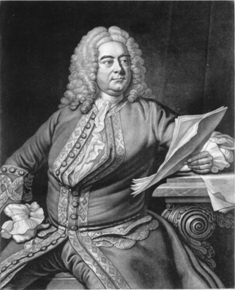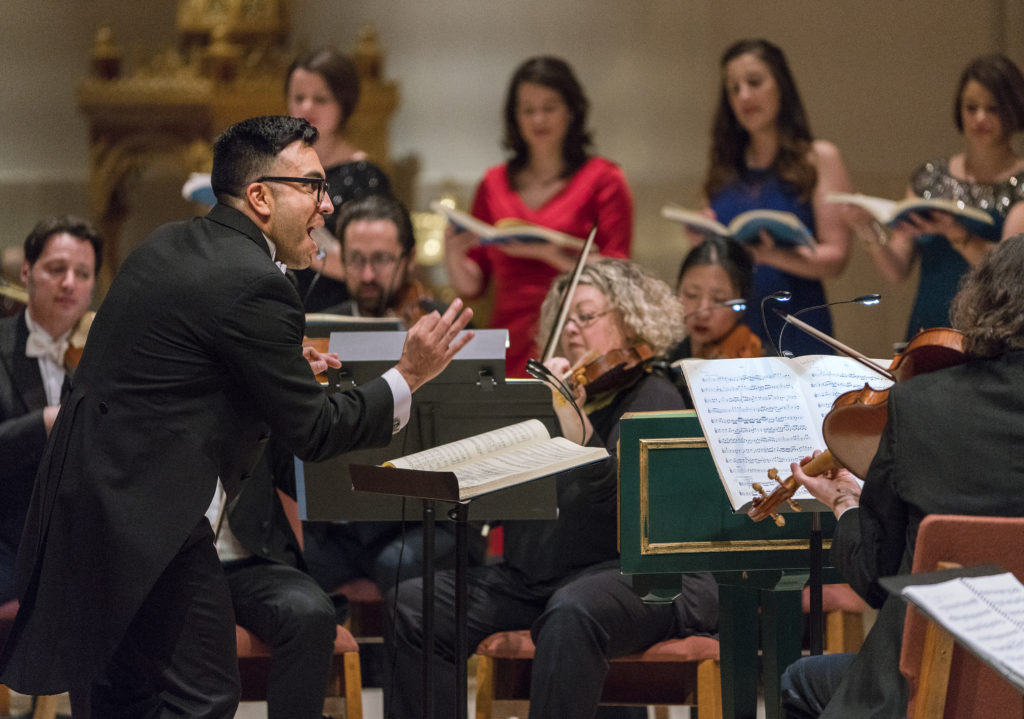Bach Collegium San Diego’s Wonderful Peripatetic Handel’s “Messiah”
By David Gregson
One of the better performances of Handel’s Messiah you are ever likely to hear moved peripatetically up the coast from San Diego to Carlsbad on Wednesday, December 20. Tuesday evening, under the direction of Ruben Valenzuela, the polished and brilliant Bach Collegium San Diego presented the great oratorio in the First Presbyterian Church on Date Street. The night before found the Collegium holding forth at St. James by-the-Sea Episcopal Church, La Jolla.
G. F. HANDEL: MESSIAH HWV 56
Soloists:
Clara Rottsolk, soprano
Melanie Russell, soprano
Jay Carter, countertenor
Lexa Ferrill, alto
Derek Chester, tenor
Mischa Bouvier, baritone
Review by David Gregson
Having avoided it for several Christmas seasons in succession, I returned to Handel’s Messiah last Tuesday with refreshed ears. The holidays can be tedious musically. Always the same old fare, and most of it so miserably inappropriate for our Southern California climate. “Jingle Bells” indeed!
But Bach Collegium San Diego’s “complete version” of Handel’s great oratorio is in some ways a revelation, worth hearing over and over again — at least the way it sounded Tuesday night in the First Presbyterian Church of San Diego, a handsome venue with reasonably good acoustics.
The Collegium forces consisted of six vocal soloists, a chorus of 17 singers, and a small orchestra of 12 strings, one theorbo, two trumpets, plus timpani, organ and harpsichord. You do not need Eugene Ormandy conducting the full Philadelphia Orchestra and the Mormon Tabernacle Choir, though some of us oldsters grew up with that recording on LP. It was many years before historically informed performance practices came around. And I think this week may be the first time I ever noticed a theorbo in the Messiah — and I loved its at times aggressive punctuation.
Many people, myself included, have probably sung in a Christmas or Easter Messiah, perhaps in a college or a church choir or another amateur choral group. I recall at one time being a part of a “Sing-Along Messiah” at War Memorial Opera House in San Francisco. The work suffers from being overly familiar, but to really hear it and to be genuinely moved by it — well, that’s another thing. The Collegium offered that sort of experience last Tuesday. The transparency of the instrumental textures, the clean diction and clarity of the choral lines and their subtle dynamic shadings all served to thrill us and to reveal the genius of the composer.
 Conductor Ruben Valenzuela favored fleet, crisp tempi that were both stylish and exhilarating without sacrificing dramatic gestures or Handel’s illustrative musical symbolism (sheep going astray, potters’ vessels being dashed to pieces, etc.) — and these tempi also brought the entire performance in at less than three hours’ length. That time included one longish intermission which, however, was not enough for most men and women to visit the church’s restroom facilities, none of which were constructed with large concert crowds in mind. (One does wonder about the regular congregation!) There was also a very brief break in the three-part oratorio, this one immediately after the famed “Hallelujah Chorus” in Part Two. And yes, most people in the audience stood up for it, although I am certain nobody knows exactly why. A relief from the rigid, uncomfortable pews perhaps?
Conductor Ruben Valenzuela favored fleet, crisp tempi that were both stylish and exhilarating without sacrificing dramatic gestures or Handel’s illustrative musical symbolism (sheep going astray, potters’ vessels being dashed to pieces, etc.) — and these tempi also brought the entire performance in at less than three hours’ length. That time included one longish intermission which, however, was not enough for most men and women to visit the church’s restroom facilities, none of which were constructed with large concert crowds in mind. (One does wonder about the regular congregation!) There was also a very brief break in the three-part oratorio, this one immediately after the famed “Hallelujah Chorus” in Part Two. And yes, most people in the audience stood up for it, although I am certain nobody knows exactly why. A relief from the rigid, uncomfortable pews perhaps?
Almost from the very start one sensed this was going to be a great Messiah evening. Tenor Derek Chester took physical command of the performance platform with “Comfort ye my people, saith your God.” This and the aria, “Let every valley be exalted” exuded authority embellished by fine musicianship. It helps to be gifted with a voice perfectly suited to this kind of music. He excelled in all his assignments including “Thou shalt break them with a rod of iron” and the duet with soprano, “O death, where is thy sting?”
Baritone Mischa Bouvier appeared after an impressive first choral entry celebrating the glory of the Lord being revealed, and he remained a welcome presence throughout the evening. He had some of the work’s most memorable numbers, including the shaking of “the heavens, the earth, the seas and the dry land” — but especially “The trumpet shall sound” in which he was accompanied by trumpet player Josh Cohen sounding glorious while standing high in the church pulpit. A fine artist. The trumpet and timpani players were just grand — perfectly integrating, never overwhelming.
Several soloists seemed born to sing their parts. While he avoided expressive facial and physical gestures unlike his compatriots, countertenor Jay Carter brought a sense of spiritual purity to “O thou that tellest good tiding to Zion,” while soprano Melanie Russell sounded truly angelic in her rejoicing and bringing us “good tidings of great joy.” Alto Lexa Ferrill was vocally sound, but she did not attempt to bring dramatic urgency to her “refiner’s fire” in Part One. She was better suited to the wonderful duet with soprano Clara Rottsolk. “He shall feed his flock”. Rottsolk welcomed in Part Three with a warm rendition of “I know that my Redeemer liveth.”
In sum — a rewarding musical evening, suitable for any part of the year. The Messiah may be overexposed, but it is surely not overrated. And, I’ll say it again: the Bach Collegium San Diego is one of our great local musical treasures.
As far as the audience ritual for the “Hallelujah Chorus” is concerned, I agree that the music is absolutely splendid and Christians should prepare the way for the Lord. But when I was attending a performance of Handel’s opera/oratorio Semele one year in Santa Fe, we were treated to a finale in which the pagan Dionysus, the Greek demigod of wine and ecstasy, rose totally nude from somewhere under the stage. Handel’s chorus at this point was unabashedly joyous and I wondered if we should all be standing.
VIOLIN
Heesun Choi
Susan Feldman
Andres Gonzalez
Adam LaMotte, leader
Maria Lin
Laura Rubinstein-Salzedo
Amy Wang
VIOLA
Andrew Waid
Aaron Westman
CELLO
Heather Vorwerck
Alex Greenbaum
CONTRABASS
Shanon Zusman
HARPSICHORD & ORGAN
Michael Sponseller
Ruben Valenzuela
THEORBO
John Lenti
TRUMPET
Josh Cohen
Melissa Rodgers
TIMPANI
Maury Baker
SOPRANOS
Anne-Marie Dicce
Clara Rottsolk
Melanie Russell
Katie Walders
Anne Whattoff
ALTO/MEZZO SOPRANOS
Jay Carter
Janelle DeStefano
Lexa Ferrill
Adriana Manfredi
Countertenor
Jay Carter
TENORS
Derek Chester
Paul D’Arcy
Mitch Rosenthal
Matthew Tresler
BARITONES/BASSES
Mischa Bouvier
Joel Nesvadba
Stephen Salts
Patrick Walders

